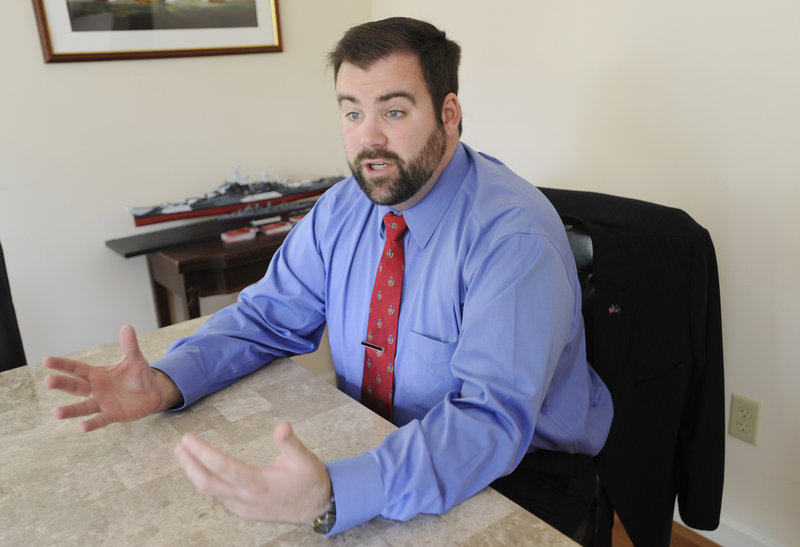First of two stories on the Republican candidates for the U.S. House.
Patrick Calder is young for a congressional candidate, but he sees that as an advantage. At 29, the political newcomer has his sights set on Washington, where he wants to be a voice for the working people in Maine’s 1st Congressional District.
“I think we need to look at new, novel and creative approaches to looking at (the country’s) problems, and that’s what I bring to the table,” he said. “I think I’m unique and I think I’d be an excellent congressman because I am not ingrained into the political establishment.”
Calder, a merchant mariner from Portland, and state Senate Majority Leader Jonathan Courtney, R-Springvale, are running for the 1st District nomination in next week’s Republican primary. The winner will face incumbent Democrat Chellie Pingree in the general election in November.
This is Calder’s second run for public office. In 2010, he ran and lost against Democrat Peter Stuckey in House District 114.
“Most of all what I took away from it, and what I’ve carried into this campaign, is the enjoyment and the satisfaction that comes just from being out and talking to people and seeing what’s on their minds and hearing what they have to say,” he said. “I’m finding there are a lot more people than just me who think we’re on the wrong track and we need to do something about it.”
Calder said, over and over, that he sees people needing the government’s attention.
“I feel very privileged to be in a position now where I’m able to give a voice to a lot of these people who are the silent majority in American politics: the people who quietly pay their bills and just follow the rules and yet are not getting a fair shake,” he said.
Calder grew up in Eastport, where his father worked as a sea captain and his mother is a longshoreman. After graduating from Shead High School in 2000, he followed his father and went to Massachusetts Maritime Academy. He was active in student government before graduating in 2004 with a degree in marine engineering.
Calder lived out of state for a few years, traveling nationally and internationally as a merchant mariner and marine engineer. Two years ago, he decided to settle in Portland and commute to Hawaii, where he is first engineer of The Pride of America, the only U.S.-flagged cruise ship.
He is responsible for the day-to-day maintenance and operation of the ship’s engineering plant, supervising 30 people. The ship carries 2,500 passengers and 900 crew members.
Calder loves his job, but he is willing to give it up to serve in Congress.
“It wasn’t until I got out of college and became a taxpaying member of the work force that things really started to hit home,” he said. “I’d almost be a little bit embarrassed to have kids now and say to them, ‘All right, this is the country we’re giving you. This is the country you have to look forward to.’ It’s not what we were led up to believe this country would be.”
Calder, a social moderate, said Congress must consider ending foreign aid and should examine entitlement programs, such as Medicare and Social Security, for ways to cut spending.
“The single most important thing to do is start realizing that if the government tries to be everything for everybody, in the end they won’t be able to do anything for anyone,” he said.
Barbara Campbell Harvey of Portland works on the campaign and knows Calder through his role as chairman of the Portland Republican City Committee. Despite his lack of experience in elective office, she is confident in his leadership skills.
“His youth is a positive in that he is representing a younger generation with a different point of view. He’s not a career politician,” she said.
Matthew Boucher, Calder’s campaign manager, agrees.
“I believe he’s going to bring representation from our generation,” he said. “The Republican Party keeps running the same middle-aged, white male candidates over and over again. I feel it’s time we run something different and see what happens.”
Ron Schmidt, an associate professor of political science at the University of Southern Maine, said Calder has some big challenges to overcome — especially if he wins the GOP nomination and faces Pingree in the general election.
“The name recognition and resources (that) incumbents can draw on are difficult to match,” he said.
Schmidt said Calder appears to be positioning himself to run as a Washington outsider with fresh ideas, a tactic that Schmidt thinks would typically be more effective in Maine’s 2nd Congressional District.
“The kind of race that Calder has put himself in is a hard one to win, but you never know what is going to happen politically,” Schmidt said. “It’s very difficult to do what Patrick Calder has set out to do. It’s a steep uphill fight.”
Even if Calder doesn’t win the nomination, the race could help his political career, Schmidt said.
“This is a high-profile campaign, so even if Calder loses, it will bring him some name recognition,” he said. “That could position him well in a later campaign.”
Staff Writer Gillian Graham can be contacted at 791-6315 or at: ggraham@mainetoday.com
Twitter: grahamgillian
Send questions/comments to the editors.




Success. Please wait for the page to reload. If the page does not reload within 5 seconds, please refresh the page.
Enter your email and password to access comments.
Hi, to comment on stories you must . This profile is in addition to your subscription and website login.
Already have a commenting profile? .
Invalid username/password.
Please check your email to confirm and complete your registration.
Only subscribers are eligible to post comments. Please subscribe or login first for digital access. Here’s why.
Use the form below to reset your password. When you've submitted your account email, we will send an email with a reset code.